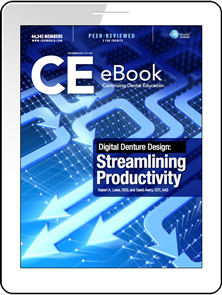Digital Denture Design: Streamlining Productivity
Released: Monday, December 28, 2015
Expires: Monday, December 31, 2018
By Robert A. Lowe, DDS; David Avery, CDT, AAS
Commercial Supporter: Kulzer
Challenges facing prosthetic dentistry include a dwindling number of trained dental technicians, a time-consuming and costly denture process, and an increasing amount of adults needing full dentures. Addressing those issues are products offering digital denture design, which eliminate the hours of clinical time needed and help to simplify a cumbersome process while providing accuracy. This article presents a case report that illustrates the ease of digital denture design.
LEARNING OBJECTIVES:
-
Understand the issues regarding traditional denture processes.
-
Identify the key differences and benefits in using digital denture processes.
-
Explain how the digital denture process works.
About the Authors
Dr. Robert A. Lowe received his DDS degree from Loyola University School of Dentistry and postgraduate training in different areas of dental care, including restorative and rehabilitative dentistry, cosmetic dentistry, endodontics, prosthodontics, periodontics, oral surgery, and sedation dentistry, completing a rotation in surgical anesthesia. He served for 10 years in a full- and part-time capacity as an associate clinical professor of restorative and rehabilitative dentistry at Loyola. Dr. Lowe has lectured at all of the major dental meetings in the United States, including the American Dental Association Annual Meeting, the American Academy of Cosmetic Dentistry, and the American Society of Dental Aesthetics. In 2005, he was nominated to receive Diplomate status on the American Board of Aesthetic Dentistry. This is an honor shared by fewer than 50 dentists in the entire United States. Throughout his career, Dr. Lowe has also written hundreds of articles on dental care and dental health topics, many of which have appeared in highly regarded professional dental publications. He has published a monthly column in Dental Products Report and was a contributing author to the recent textbook Aesthetic Restorative Dentistry – Principles and Practice.
David Avery received his AS degree in dental laboratory technology from Durham Technical College in Durham, North Carolina. He has ongoing academic relationships with undergraduate and postgraduate dental programs at the University of North Carolina, Medical College of Georgia, Virginia Commonwealth University, University of Tennessee, University of Mississippi, Tufts University, and West Virginia dental schools. He is also a visiting lecturer at the GPR and Oral Medicine programs at Carolina’s Medical Center, Wake Forest University, University of Virginia Medical Center, as well as numerous residency programs within the US Veteran’s Administration and Armed Forces. Since earning his CDT credential in 1986, he has been a member of the Drake Precision Dental Laboratory’s executive management team, and is currently the Director of Professional Services. He has published in numerous laboratory-based and clinically based journals and has presented more than 700 scientific programs for local, regional, and national professional clinical and laboratory organizations covering every aspect of dental laboratory technology, management, and communication.
